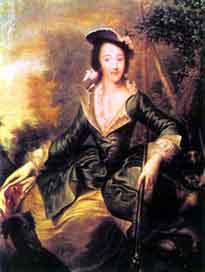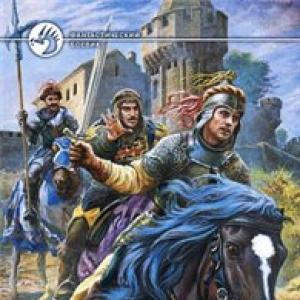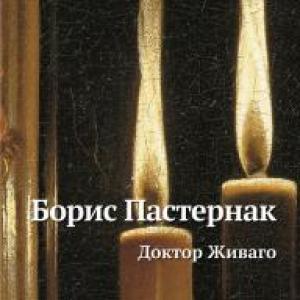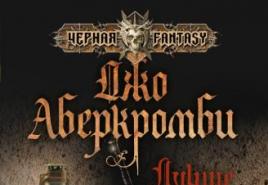How old was Pyotr Fedorovich? Peter III - biography, information, personal life
Years of life : February 21st 728 - June 28, 1762.
(Peter-Ulrich) The All-Russian Emperor, son of the Duke of Holstein-Gottorp, Karl-Friedrich, son of the sister of Charles XII of Sweden, and Anna Petrovna, daughter of Peter the Great (born in 1728); he is thus the grandson of two sovereign rivals and could, under certain conditions, be a candidate for both the Russian and the Swedish throne. In 1741, he was elected, after the death of Eleanor Ulrika, the successor to her husband Frederick, who received the Swedish throne, and on November 15, 1742, he was declared heir to the Russian throne by his aunt Elizaveta Petrovna.
Weak physically and morally, Pyotr Fedorovich was brought up by Harsh Marshal Brummer, who was more likely a soldier than a teacher. The barracks order of life, established by the latter for his pupil, in connection with strict and humiliating punishments, could not but weaken the health of Pyotr Fedorovich and prevented the development of moral concepts and feelings of human dignity in him. The young prince was taught a lot, but so ineptly that he received a complete aversion to science: Latin, for example, was tired of him so that later in St. Petersburg he forbade placing Latin books in his library. They taught him, moreover, preparing mainly for the occupation of the Swedish throne and, therefore, brought up in the spirit of the Lutheran religion and Swedish patriotism - and the latter, at that time, was expressed, among other things, in hatred of Russia.
In 1742, after the appointment of Pyotr Fedorovich as heir to the Russian throne, they began to teach him again, but in a Russian and Orthodox way. However, frequent illnesses and marriage to the Princess of Anhalt-Zerbst (future Catherine II) prevented the systematic conduct of education. Pyotr Fedorovich was not interested in Russia and superstitiously thought that he would find his doom; Academician Shtelin, his new teacher, despite all efforts, could not inspire him with love for his new homeland, where he always felt like a stranger. Military affairs - the only thing that interested him - was not so much a subject of study for him as fun, but his reverence for Frederick II turned into a desire to imitate him in small things. The heir to the throne, an adult already a man, preferred the cause to the amusement, which every day became more and more strange and unpleasantly amazed everyone around him.
"Peter showed all the signs of a stopped spiritual development," says S.M. Soloviev; "he was an adult child." The Empress was struck by the underdevelopment of the heir to the throne. The question of the fate of the Russian throne seriously occupied Elizabeth and her courtiers, and came to various combinations. Some wanted the empress, bypassing her nephew, to transfer the throne to his son Pavel Petrovich, and to appoint Grand Duchess Ekaterina Alekseevna, wife of Pyotr Fedorovich, regent, until his coming of age. That was Bestuzhev’s opinion, Nick. Willow Panina, Yves. Willow Shuvalova. Others stood for the proclamation of the heiress to the throne of Catherine. Elizabeth died before deciding on anything, and on December 25, 1761, Peter Fedorovich ascended the throne under the name of Emperor Peter III. He began his activities by decrees, which, under other conditions, could give him a popular disposition. Such is the decree of February 18, 1762 on the liberty of the nobility, which removed obligatory service from the nobility and was, as it were, a direct predecessor of the Catherine’s granted letter to the nobility of 1785. This decree could make the new government popular among the nobility; another decree on the destruction of the secret office, which was in charge of political crimes, was supposed to contribute to its popularity among the masses.
It happened, however, differently. Remaining in his soul a Lutheran, Peter III neglected the clergy, closed house churches, addressed insulting decrees to the Synod; by this he excited the people against himself. Surrounded by Holstein, he began to remake the Russian army in Prussian fashion and thereby armed himself with a guard, which at that time was almost exclusively noble in composition. Encouraged by his Prussian sympathies, Peter III immediately after accession to the throne refused to participate in the Seven Years War and, at the same time, from all Russian conquests in Prussia, and at the end of his reign began the war with Denmark over Schleswig, who he wanted to acquire for Holstein . This excited the people against him, who remained indifferent when the nobility, represented by the guards, openly rebelled against Peter III and proclaimed Empress Catherine II (June 28, 1762). Peter was removed to Ropsha, where he, on July 7, suffered death.
Russian Biographical Dictionary / www.rulex.ru / Cf. Brickner "History of Catherine the Great", "Notes of the Empress Catherine II" (L., 1888); "Memoirs of the princesse Daschcow" (L., 1810); "Notes by Shtelin" ("Reading of the Society of History and Antiquities of Russia", 1886, IV); Bilbasov "History of Catherine II" (vols. 1 and 12). M. Peninsula.
The future Peter III was born in the city of Kiel, in the Duchy of Holstein, whose owner, Duke Karl Friedrich, was given in 1725 the eldest daughter of Peter - Tsesarevna Anna Petrovna. Immediately after the birth of a boy named Karl Peter Ulrich, 20-year-old Anna died. The father did not pay attention to his son, completely giving him into the hands of rude and ignorant educators. In 1739, the Duke Karl Friedrich died, and the young prince became the Duke of Holstein. Immediately after her coming to power in 1741, Empress Elizabeth - an aunt of Karl Peter Ulrich - called him to Russia.
Here in 1742 he was baptized according to the Orthodox rite, was named Pyotr Fedorovich and declared heir to the Russian throne. At first, Empress Elizabeth did not look for souls in her nephew, but she did not like many of the youth’s traits, and gradually the Empress cooled off to Peter, estranged him from herself.
One of the reasons for the cooling was that the grandson of Peter the Great was completely indifferent to Russia and to everything Russian. He yearned for Holstein, often acted contrary to and even in spite of the wishes of his aunt. From an early age, Peter showed himself as a stubborn, stupid person, little capable of governing the country. Moody and infantile, Peter was not an evil or cruel man. At the Russian court, he felt like a stranger, he was constantly secretly watched and immediately informed the Empress of all his actions and words.
It is not surprising that the heir to the throne did not like to be at court, but sought to leave for his estate Oranienbaum near St. Petersburg. There he could take refuge from the aunties' spies and live as he wanted. In the picturesque park of Oranienbaum, the architect Antonio Rinaldi built a cozy palace for Peter Fedorovich. Nearby stood the graceful Chinese Palace and the Katalnaya Gorka pavilion - the place of winter festivities.
But the true joy of Peter was a special military unit brought for the heir to the throne directly from Holstein. Her soldiers and officers were stationed in the small fortress of Petershants. Only here, behind the earthen fortifications of the fortress, among the Holstein officers, did Peter feel safe, in his native setting.
From an early age, Peter III considered the Prussian King Frederick II a role model. During the Seven Years' War with Prussia, Peter did not hide his sympathy for the enemy of Russia. And the first thing that Peter did when he entered the Russian throne was to conclude peace with Frederick and thereby actually save him from defeat by the Allies. Moreover, at the beginning of 1762, Peter III signed a defensive alliance with Frederick and gave the order to prepare the Russian army for a campaign against Denmark, the state, at the beginning of the 18th century. grabbed a hefty piece of territory from her beloved Peter Holstein.
Preparation for a new, completely unnecessary war for Russia was one of the reasons for the coup, as a result of which Peter III was overthrown.
February 18, 1762 - Manifesto on the “granting of liberty and freedom to the entire Russian nobility”
During his short reign, Peter III issued several important laws that remained in the memory of his contemporaries. With one decree, he forbade the use of the expression “Word and deed!”, Uttering which scammers attracted the attention of the authorities to a committed or conceived state crime. This custom terrorized society and produced false denunciations. The decree says: “A hateful phrase, namely,“ the Word and the deed ”, should not mean anything from now on, and we prohibit the use of it, and if anyone now uses it, in drunkenness or in a fight, or avoiding beatings and punishment, immediately punish them as mischievous and mischievous are punished by the police. ”
By another decree, the king liquidated the terrible Secret Chancellery - the political police, the place of torture and secret executions. In fact, no one canceled the denunciations, just now they should have been submitted without screaming, in writing, and the functions of the odious Secret Chancellery were transferred to the Senate Secret Expedition, into which all the employees of the former Secret Chancellery were transferred. Peter III signed several important decrees: he forbade the persecution of the Old Believers, abolished a number of monopolies, and established the State Bank. All these measures testified that the new sovereign, despite his extravagance, could become a major statesman. But this was not destined to come true - his own wife overthrew him.
But the most important state act of the times of Peter III was the manifesto on "granting liberty and freedom to the entire Russian nobility." It is possible that it was prepared under Elizabeth. According to the manifesto, for the first time the nobles received freedom from compulsory service, they were given the right to resign, travel freely abroad, and even enlist in service to other sovereigns. From this manifesto important class reforms began, continued already in the reign of Catherine II. Their essence is the liberation of the nobility from the all-pervasive power of the autocratic state, the development in the noble environment of a sense of honor, human dignity, freedom of thought and speech.
Peter III was a very extraordinary emperor. He did not know the Russian language, he liked to play soldiers and wanted to baptize Russia according to the Protestant rite. His mysterious death led to the appearance of a whole galaxy of impostors.
Heir to two empires
From birth, Peter could claim two imperial titles: Swedish and Russian. On his father's side, he was a great-nephew of King Charles XII, who himself was too busy with military campaigns to marry. Peter’s grandfather on his mother’s side was Karl’s main enemy, the Russian Emperor Peter I.
An early orphaned boy spent his childhood with his uncle, Bishop Adolf Eitinsky, where he brought up hatred of Russia. He did not know the Russian language, was baptized according to Protestant custom. True, he did not know other languages \u200b\u200bbesides native German, he only spoke a little French.
Peter was supposed to take the Swedish throne, but the childless empress Elizabeth remembered the son of her beloved sister Anna and declared him heir. The boy is brought to Russia to meet the imperial throne and death.
Toy games
In fact, a sickly young man was especially not needed by anyone: neither the aunt-empress, nor the teachers, nor, subsequently, his wife. Everyone was interested only in his origin, even the cherished words: “Grandson of Peter I” were added to the official title of heir.
And the heir himself was interested in toys, first of all, soldiers. Can we blame him for infantilism? When Peter was brought to St. Petersburg, he was only 13 years old! Dolls attracted the heir more than government affairs or a young bride.
True, his priorities do not change with age. He continued to play, but secretly. Catherine writes: “In the afternoon, his toys were hidden in and under my bed. The Grand Duke went to bed first after dinner and, as soon as we were in bed, Cruz (the chamberlain) locked the door with a key, and then the Grand Duke played until one or two in the night. ”
Over time, toys become bigger and more dangerous. Peter is allowed to discharge from Holstein a regiment of soldiers whom the future emperor enthusiastically drives on the parade ground. At this time, his wife is learning Russian and studying French philosophers ...
"Madam help"
In 1745, in St. Petersburg, the wedding of the heir Peter Fedorovich and Ekaterina Alekseevna, the future Catherine II, was magnificently celebrated. There was no love between the young spouses - they differed too much in character and interests. The more intelligent and educated Catherine ridicules in her husband’s memoirs: “he doesn’t read books either, and even if he does, he’s either a prayer book or descriptions of torture and execution”.
Peter's duty was also not going smoothly, his letters testify to this, where he asks his wife not to share a bed with him, which has become “too narrow”. Hence the legend that the future Emperor Paul was not born at all from Peter III, but from one of the favorites of the loving Catherine.
However, despite the coldness in relations, Peter always trusted his wife. In difficult situations, he turned to her for help, and her tenacious mind found a way out of any troubles. Therefore, Catherine received from her husband the ironic nickname "Madam help."
Russian marquise Pompadour
But not only children's games distracted Peter from his conjugal bed. In 1750, two girls were introduced to the court: Elizabeth and Ekaterina Vorontsov. Ekaterina Vorontsova will be a faithful companion of her royal namesake, Elizabeth will take the place of beloved Peter III.
The future emperor could take any court beauty into his favorites, but his choice, nevertheless, fell on this "fat and awkward" maid of honor. Love is evil? However, is it worth trusting the description left in the memoirs of a forgotten and abandoned spouse.
Empress Elizabeth Petrovna, sharp-tongued, found this love triangle quite amusing. She even nicknamed the good-natured, but not far-off Vorontsov "Russian de Pompadour."
It was love that became one of the reasons for the fall of Peter. At court, it was rumored that Peter was going, following the example of his ancestors, to send his wife to the monastery and marry Vorontsova. He allowed himself to insult and harass Catherine, who, seemingly, suffered all his whims, but in fact cherished plans for revenge and looked for powerful allies.
Spy in the service of Her Majesty
During the Seven Years War, in which Russia sided with Austria. Peter III openly sympathized with Prussia and personally Frederick II, which did not add popularity to the young heir.
But he went even further: the heir handed over to his idol secret documents, information about the number and location of Russian troops! Upon learning of this, Elizabeth was furious, but she forgave much to the near nephew for the sake of his mother, her beloved sister.
Why is the heir to the Russian throne so openly helping Prussia? Like Catherine, Peter is looking for allies, and hopes to find one of them in the person of Frederick II. Chancellor Bestuzhev-Ryumin writes: “The Grand Duke was convinced that Frederick II loved him and responded with great respect; therefore, he thinks that as soon as he ascends the throne, the Prussian king will seek his friendship and will help him in everything. ”
186 days of Peter III
After the death of Empress Elizabeth, Peter III was proclaimed emperor, but was not officially crowned. He proved himself an energetic ruler, and over the six months of his reign he managed, contrary to popular belief, to do a lot. The assessments of his reign are very different: Catherine and her supporters describe Peter as a demented, ignorant soldier and Russophobe. Modern historians create a more objective image.
First of all, Peter made peace with Prussia on unfavorable conditions for Russia. This caused discontent in army circles. But then his "Manifesto on the nobility of liberty" gave the aristocracy huge privileges. At the same time, he issued laws prohibiting the torture and killing of serfs, stopped the persecution of the Old Believers.
Peter III tried to please everyone, but in the end, all attempts turned against himself. The reason for the conspiracy against Peter was his ridiculous fantasies about the baptism of Russia according to the Protestant model. The Guard, the main support and support of the Russian emperors, spoke on the side of Catherine. In his palace in Orienbaum, Peter signed the abdication.
Life after death
The death of Peter is one big mystery. Emperor Paul did not in vain compare himself with Hamlet: throughout the reign of Catherine II, the shadow of her dead husband could not find peace. But was the empress guilty of the death of her husband?
According to the official version, Peter III died of an illness. He was not distinguished by good health, and the unrest associated with the coup and abdication could kill a stronger man. But the sudden and so quick death of Peter - a week after the overthrow - caused a lot of speculation. For example, there is a legend according to which the emperor’s killer was Catherine’s favorite Alexei Orlov.
The illegal overthrow and the suspicious death of Peter created a galaxy of impostors. In our country alone, more than forty people tried to impersonate the emperor. The most famous of them was Emelyan Pugachev. Abroad, one of the false Petrov even became the king of Montenegro. The last impostor was arrested in 1797, 35 years after the death of Peter, and only after that the shadow of the emperor finally found peace.
Story character
SLANDER
THROUGH THE CENTURY
Peter III -
unknown russian emperor
The poet gives a lesson to historians
In Russian history, perhaps, there is no ruler more blasphemous by historians than Emperor Peter III
The authors of historical studies speak even better of the crazy sadist Ivan the Terrible than of the unfortunate emperor. What epithets have historians of Peter III not awarded: "spiritual insignificance", "cobbler", "drunkard", "Holstein martinet" and so on and so forth.
What did the emperor, who reigned only six months (from December 1761 to June 1762), was guilty of learned men?
Holstein Prince
The future emperor Peter III was born on February 10 (21 - in a new style) in February 1728 in the German city of Kiel. His father was the Duke of Karl Friedrich Holstein-Gottorp - the ruler of the North German land of Holstein, his mother - the daughter of Peter I Anna Petrovna. As a child, Prince Karl Peter Ulrich Holstein-Gottorp (so called Peter III) was declared the heir to the Swedish throne. 
Emperor Peter III
However, at the beginning of 1742, at the request of the Russian Empress Elizabeth Petrovna, the prince was brought to St. Petersburg. As the only descendant of Peter the Great, he was declared the heir to the Russian throne. The young Duke of Holstein-Gottorp converted to Orthodoxy and was named Grand Duke Peter Fedorovich.
In August 1745, the empress married the heir to the German princess Sophia Frederick Augusta, daughter of Prince Anhalt-Zerbst, who was in military service with the Prussian king. Having adopted Orthodoxy, the Princess of Anhalt-Zerbst began to be called the Grand Duchess Catherine Alekseevna.

Grand Duchess Catherine Alexeevna - future Empress Catherine II
The heir and his wife could not stand each other. Peter Fedorovich had lovers. His last passion was Countess Elizabeth Vorontsova, daughter of General-General Roman Illarionovich Vorontsov. Ekaterina Alekseevna had three constant lovers - Count Sergei Saltykov, Count Stanislav Ponyatovsky and Count Chernyshev. Soon the favorite of the Grand Duchess became an officer of the Life Guard Grigory Orlov. However, she often had fun with other guard officers.
September 24, 1754 Catherine gave birth to a son, who was named Paul. At court, it was said that the real father of the future emperor is Catherine's lover Count Saltykov. Peter Fedorovich himself grinned bitterly:
“God knows where my wife comes from.” I don’t know too much if this is my child and should I take it personally ...
Short reign
On December 25, 1761, Empress Elizaveta Petrovna rested in a Bose. Peter Fedorovich, Emperor Peter III, ascended the throne.
First of all, the new sovereign stopped the war with Prussia and withdrew the Russian troops from Berlin. For this Petra was hated by guards officers who longed for military glory and military awards. Dissatisfied with the actions of the emperor and historians: pundits complain that de Peter III "nullified the results of Russian victories."
It would be interesting to know what kind of results do the respected researchers mean?
As you know, the Seven Years' War of 1756-1763 was caused by the aggravation of the struggle of France and England overseas colonies. For various reasons, seven more states were drawn into the war (in particular, Prussia, which clashed with France and Austria). But what interests the Russian Empire pursued, speaking in this war on the side of France and Austria, is completely incomprehensible. It turned out that Russian soldiers died for the right of the French to rob colonial peoples. Peter III stopped this senseless slaughter. For which he received a "strict reprimand with an entry" from grateful descendants.
Soldiers of the army of Peter III
After the war ended, the emperor settled in Oranienbaum, where, according to historians, he “indulged in drunkenness” with his Holstein companions. However, judging by the documents, from time to time Peter was also involved in state affairs. In particular, the emperor wrote and published a number of manifestos on the transformation of the state system.
Here is a list of the first events that Peter III outlined:
Firstly, the Secret Chancellery was abolished - the famous secret state police, which terrified all citizens of the empire, from the commoner to the noble nobleman, without exception. According to one denunciation, agents of the Secret Chancellery could seize any person, put him in casemates, betray him to the most terrible tortures, and execute him. The emperor freed his subjects from this arbitrariness. After his death, Catherine II restored the secret police - called the Secret Expedition.
Secondly, Peter declared religious freedom for all his subjects: "let them pray as they want, but not to have them in reproach or in a curse." It was an almost unthinkable step for that time. Even in enlightened Europe, there was still no complete freedom of religion. After the death of the emperor, Catherine II, a friend of the French Enlightenment and the “philosopher on the throne,” canceled the decree on freedom of conscience.
Thirdly, Peter abolished church supervision over the personal lives of his subjects: "to not condemn anyone for adulterous sin, for even Christ did not condemn." After the death of the king, church espionage was reborn.
Fourth, realizing the principle of freedom of conscience, Peter stopped the persecution of the Old Believers. After his death, state power resumed religious persecution.
Fifth, Peter announced the liberation of all monastic serfs. He subjugated the monastery estates to civilian colleges, gave arable land to the former monastery peasants for eternal use and overlaid them only with ruble dues. For the maintenance of the clergy, the king appointed "his own salary."
Sixth, Peter allowed the nobles to travel abroad without hindrance. After his death, the "iron curtain" was restored.
Seventhly, Peter announced the introduction of a public court in the Russian Empire. Catherine canceled the publicity of the proceedings.
Eighth, Peter issued a decree on the “silver-free service”, forbidding gifts to be presented to senators and government officials by peasant souls and state lands. Signs of encouragement of senior officials should have been only orders and medals. Having ascended the throne, Catherine first of all gifted her associates and minions with peasants and estates.

One of the manifestos of Peter III
In addition, the emperor prepared a host of other manifestos and decrees, including on the restriction of personal dependence of peasants on landowners, on the optional service in the army, on the optional observance of religious posts, etc.
And all this was done in less than six months of the reign! Knowing this, how can one believe the fables about the "sound drinking" of Peter III?
Obviously, the reforms that Peter intended to carry out were ahead of their time for a long time. Could their author, who dreamed of affirming the principles of freedom and civic dignity, be a "spiritual insignificance" and a "Holstein soldier"?
So, the emperor was engaged in public affairs, between which, according to historians, smoked in Oranienbaum.
And what was the young empress doing at that time?
Ekaterina Alekseevna with her many lovers and hangers-on settled in Peterhof. There she actively intrigued against her husband: she gathered supporters, spread rumors through her lovers and their drinking buddies, and attracted officers to her side.
By the summer of 1762 a conspiracy arose, the empress became its soul. Influential dignitaries and generals were involved in the plot:
Count Nikita Panin, Actual Privy Councilor, Chamberlain, Senator, educator of Tsarevich Pavel;
his brother Count Peter Panin, general-general, hero of the Seven Years War;
Princess Yekaterina Dashkova, as a girl - Countess Vorontsova, closest friend and companion of Yekaterina;
her husband, Prince Mikhail Dashkov, one of the leaders of the St. Petersburg Masonic organization; Count Kirill Razumovsky, Marshal, commander of the Izmailovsky regiment, hetman of Ukraine, president of the Academy of Sciences;
Prince Mikhail Volkonsky, diplomat and commander of the Seven Years War;
Baron Korf, chief of the St. Petersburg police, as well as numerous officers of the Life Guards led by the Orlov brothers.
According to some historians, influential Masonic circles were involved in the conspiracy. In the immediate environment of Catherine, the "free masons" was represented by a mysterious "Mr. Odar." According to the eyewitness of the events of the Danish envoy A. Schumacher, under this name was the famous adventurer and adventurer Count Saint-Germain.
The events were accelerated by the arrest of one of the conspirators, Captain Lieutenant Passek.
Count Alexei Orlov - the killer of Peter III
On June 26, 1762, the Orlovs and their friends began to solder the soldiers of the capital's garrison. More than 35 thousand buckets of vodka were bought with the money that Catherine borrowed from the English merchant Felten, allegedly to buy jewelry.
On the morning of June 28, 1762, Catherine, accompanied by Dashkova and the Orlov brothers, left Peterhof and headed for the capital, where everything was already ready. Dead drunk soldiers of the guards regiments took the oath to "Empress Catherine Alexeevna", a very drunken crowd of inhabitants welcomed the "dawn of a new reign."
Peter III with his retinue was in Oranienbaum. Having learned about the events in Petrograd, ministers and generals betrayed the emperor and fled to the capital. Only the old Field Marshal Minich, General Gudovich, and several close associates remained with Peter.
On June 29, the emperor, astonished by the betrayal of the most trusted people and not having the desire to get involved in the fight for the disgusting crown, abdicated. He only wanted one thing: to be released to his native Holstein with his mistress Ekaterina Vorontsova and faithful adjutant Gudovich.
However, by order of the new ruler, the deposed king was sent to the palace in Ropsha. On July 6, 1762, the brother of the Empress’s lover Alexei Orlov and his drinking companion Prince Fedor Baryatinsky strangled Peter. It was officially announced that the emperor "died of inflammation in the intestines and apoplexy stroke" ...
So, the facts do not give any reason to consider Peter III as “insignificance” and “soldiers”. He was weak-willed, but not weak-witted. Why are historians so stubbornly blaspheming this sovereign?
St. Petersburg poet Victor Sosnora decided to understand this problem. First of all, he was interested in the question: from what sources did the researchers draw (and continue to draw!) Dirty gossip about the "dementia" and "insignificance" of the emperor?
And here is what happened: it turns out that the sources of all the characteristics of Peter III, all these gossip and fables are the memoirs of the following persons:
Empress Catherine II - who hated and despised her husband, who was the inspirer of the conspiracy against him, who actually directed the hand of the killers of Peter, who, finally, as a result of the coup, became an autocratic ruler;
Princess Dashkova, a friend and like-minded person of Catherine, who even more hated and despised Peter (contemporaries gossiped: because Peter preferred her older sister, Ekaterina Vorontsova), who was the most active participant in the conspiracy, which after the coup became "the second lady of the empire" ;
Count Nikita Panin, a close associate of Catherine, who was one of the leaders and the main ideologist of the conspiracy against Peter, and soon after the coup he became one of the most influential nobles and headed the Russian diplomatic department for almost 20 years;
Count Pyotr Panin - brother of Nikita, who was one of the active participants in the conspiracy, and then became a commander trusted and kindly monked by mercy (it was Pyotr Panin who Catherine instructed to crush the rebellion of Pugachev, who, by the way, declared himself "Emperor Peter III").
Even without being a professional historian and not being familiar with the intricacies of source study and criticism of sources, it can be safely assumed that the persons named above are unlikely to be objective in assessing the person whom they betrayed and killed.
The Empress and her "accomplices" were not enough to overthrow and kill Peter III. To justify their crimes, they had to slander their victim!
And they lied diligently, piling up the vile gossip and dirty fiction.
Catherine:
"He spent time in childishness of unheard of ..." "He was stubborn and quick-tempered, was weak and frail build."
"From the age of ten, he became addicted to drinking." "For the most part, he displayed disbelief ..." "His mind was childish ..."
"He was desperate. This often happened to him. He was a cowardly heart and a weak head. He loved oysters ..."
In her memoirs, the empress put the murdered spouse into a drunkard, a rebel, a coward, a fool, a loafer, a tyrant, a moron, a lecher, an ignoramus, an atheist ...
"With what washes, she waters her husband just for killing him!" - exclaims Victor Sosnora.
But, strangely enough, the pundits who wrote dozens of volumes of dissertations and monographs did not doubt the veracity of the killers' memories of their victim. Until now, in all textbooks and encyclopedias you can read about the "insignificant" emperor who "nullified the results of Russian victories" in the Seven Years War and then "drank with the Holstein people in Oranienbaum."
Lies have long legs ...
In preparing this article
used by Victor Sosnora
"SAVIOR OF THE FATHERLAND"
from the collection "Rulers and Fates.
Literary versions of historical events "(L., 1986)
Relations between Catherine and Peter III did not work out from the very beginning. The husband not only made himself many lovers, but openly declared that he intends to divorce his wife for the sake of Elizabeth Vorontsova. Catherine did not have to wait for support.
Peter III and Catherine II
A plot against the emperor began to be prepared even before his accession to the throne. Chancellor Alexei Bestuzhev-Ryumin had the most hostile feelings towards Peter. He was particularly annoyed by the fact that the future ruler openly sympathizes with the Prussian king. When Empress Elizaveta Petrovna became seriously ill, the Chancellor began to prepare the way for a palace coup and wrote to Field Marshal Apraksin to return to Russia. Elizaveta Petrovna recovered from her illness and deprived the chancellor of ranks. Bestuzhev-Ryumin fell out of favor and did not finish his job.
During the reign of Peter III, the Prussian system was introduced in the army, which could not but cause the indignation of the officers. It is worth noting that the emperor made no attempt to get acquainted with Russian customs and ignored the Orthodox rites. The conclusion of peace with Prussia in 1762, according to which Russia voluntarily surrendered East Prussia, was another reason for dissatisfaction with Peter III. In addition, the emperor intended to send the guard on a Danish campaign in June 1762, the goals of which were completely incomprehensible to the officers.

Elizaveta Vorontsova
The conspiracy against the emperor was organized by officers of the guard, including Grigory, Fedor and Alexei Orlov. In connection with the controversial foreign policy of Peter III, many officials joined the plot. By the way, the ruler received messages about the impending coup, but he did not take them seriously.

Alexey Orlov
June 28, 1762 (according to the old style) Peter III went to Peterhof, where his wife was supposed to meet him. However, Catherine was not there - in the early morning she left for Petersburg with Alexei Orlov. The Guard, the Senate and the Synod swore allegiance to her. In a critical situation, the emperor was confused and did not follow sound advice to flee to the Baltic states, where his loyal units were stationed. Peter III signed the abdication and was escorted by the guards to Ropsha.
July 6, 1762 (according to the old style) he died. Historians are unanimous in the opinion that Catherine did not give the order to kill Peter, at the same time, experts emphasize that she did not warn this tragedy. According to the official version, Peter died of the disease - at the autopsy, he allegedly showed signs of heart dysfunction and apoplexy. But most likely his killer was Alexei Orlov. Peter was buried in the Alexander Nevsky Lavra. Subsequently, several dozen people impersonated the emperor who was saved, the most famous of them was the leader of the Peasant War Emelyan Pugachev.










